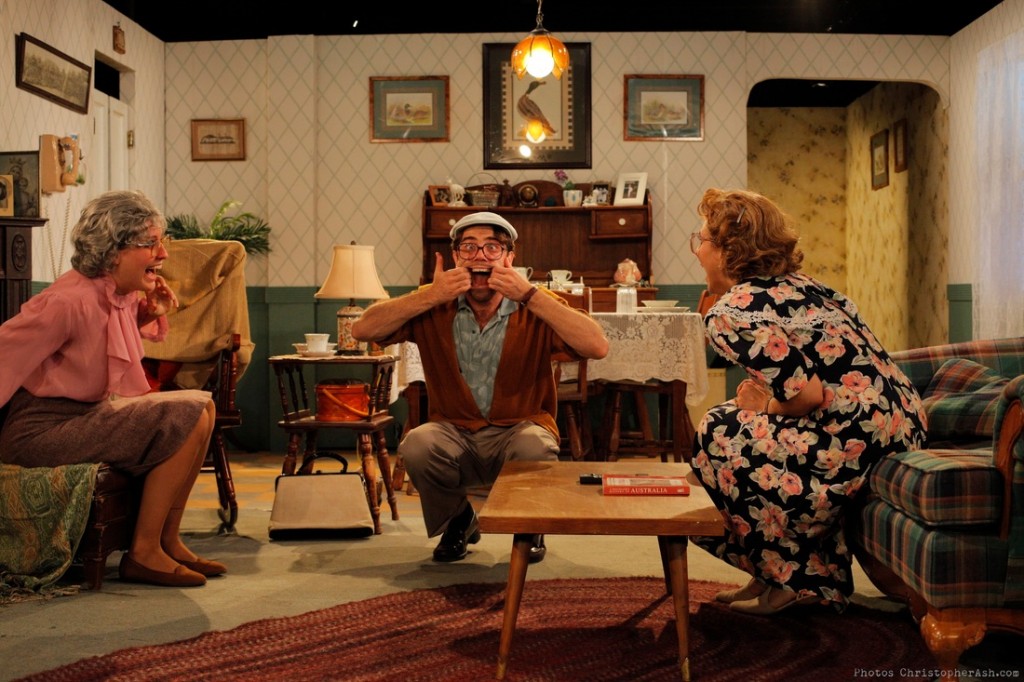
The Yale Rep’s production of Caryl Churchill’s Owners closed yesterday. I’d been hoping to head back to see it a second time. I wondered if it got snappier and nastier as the run went on. In any case, the show was a wonder of timing—in the topical-subject sense, in the comedy sense, and in the technically elaborate swirling mobile set sense.
Thinking about Owners put me in my mind of the previous Caryl Churchill show I’d seen on the Yale campus, the season-closing double feature of Drunk Enough to Say I Love You and Heart’s Desire at the Yale Summer Cabaret in August. Then I realized I hadn’t posted anything about the show here. Found my notes online and here’s the review, better late than never.
Heart’s Desire and Drunk Enough to Say I Love You
August 8-18 at the Yale Summer Cabaret. (Closed.)
By Caryl Churchill. Directed by Dustin Wills. Scenic Designer: Kate Noll. Lighting Designer: Oliver Wason. Costume Designer: Seth Bodie. Sound Designer: Rob Chikar. Puppet Designer: Dustin Wills. Production Manager/Technical Director: James Lanius. Assistant Technical Director: Joey Moro. Stage Manager: Geoff Boronda. Cast of Heart’s Desire: Ceci Fernandez, Chris Bannow, Michelle McGregor, Mamoudou Athie, Prema Cruz, Celeste Arias. Cast of Drunk Enough to Say I Love You: Ato Blankson-Wood, Mitchell Winter.
I was not in a position to review the Caryl Churchill double bill at Yale Summer Cabaret in a timely fashion. I was on vacation for the show’s opening and nearly its entire run. The company found a seat for me at the final performance.
It’s a rare treat for me, an inveterate opening-nighter, to see a show at the end rather than the beginning of its run, once it’s as settled as it’s going to be. These two one-acts were particularly strong examples of difficult works which had clearly found their tone and pacing over time. Both have jumpy, abrupt shifts in scene. To call them “stop-start” would be ridiculous, because in both cases the repetitions and gradual variations further the drama. These were not exercises in superficiality. They were, like many Caryl Churchill works, trying to find ways to stage the immediacy and topicality of tough emotions.
Heart’s Desire is about three elderly people, a married couple and an in-law, waiting for the return of a daughter who has been overseas for years. The opening lines are repeated verbatim, and staged identically, over and over, cutting off just when the play should ought by right to be really beginning. Churchill uses this gambit as an exploration of the playwriting process, gradually adding a few lines and a few twists to show melodramatic roads not taken. But she also has a much greater purpose: to expose what is unstageable, and often unactable: that sense of anticipation where our minds channel through every possible thing that could go wrong and everything that might be said. Brilliantly, Churchill shows both the terrors and virtues of such forethought. Arguments flare up in some scenarios, while in others they are averted. Ultimately, as with most of Churchill’s plays, Heart’s Desire is about living in a scary world and bracing yourself for the worst.
In the evening’s other play, Drunk Enough to Say I Love You, the world is embodied by two men in a seedy, graffiti-laden public rest room. The scariness comes from the violent encounters and stubborn arguments which punctuate what is, generally speaking, a love story. These two sharp-tongued, wound-up men love and fight and turn each other on and get on each other’s nerves and get very close to beating each other up. They also scream out details of numerous modern war atrocities, so the fact that this eight-scene blackout-laden playlet is an allegory of Anglo-American politics over the the past several decades is announced without nuance.

It seems that both these one-acts present their characters as something less than full-bodied. They are ideas, vessels, stand-ins, symbols. Yet we should remind ourselves that all characters in plays are in service of something, often something as simple as a suspenseful story or an amusing bit of pageantry. Churchill acknowledges this in a way which many lesser writers are loathe to. She then finds new and vital ways to engross audiences.
Putting these two particular one-acts on the same bill might confuse those not familiar with Churchill’s vast body of work. She has great love for scenes which end suddenly without notice, then pick up in a different timeframe. Such structures are often disparaged by theater types as “cinematic.” Churchill, however, is perfectly capable of writing linear, fluid dramas that has more vitality and power on a theater stage than it would in a film or a radio play. Her need to flip locations and styles quickly comes from a hypervigilance. Her concision demonstrates how much of the blather which writers typically use to smooth transitions between scenes can be cut completely without being missed. Heart’s Desire is all about false build-ups and the multiplicity of potential pay-offs. Drunk Enough to Say I Love You is a litany of past relations. The themes are clear and economically delivered. It helps Churchill stay on point, and not let her characters overwhelm the overarching issues at the heart of her plays.
This is as true of Owners as it is for her later one-acts. Unlike so many playwrights who—for the sake of convenience or commerciality, or both—fall into easy formats, Churchill seems to have a tight handle on what she wants to say and how long it ought to take her to say it. The best productions of her work (and I’d put assess both the Yale Summer Cabaret’s and Yale Rep’s recent efforts as very good indeed) share the playwright’s need for expediency, urgency and clarity. Caryl Churchill should careen.
